Educational Toys for Effective Learning and Development
Quality educational toys promote early childhood education, cognitive development, critical thinking and hands-on learning. Designed for preschool and early education environments, our range of products combine practicality and educational value to provide young children with a comprehensive learning experience.
Trusted Provider of Educational Toys and Comprehensive Solutions
Specializing in educational toys, we offer comprehensive services that include custom design, precision manufacturing, and strict quality control. Our toys are crafted with durable, child-safe materials to support cognitive, social, and motor skill development, ensuring exceptional value for educators and parents alike.
Our services include product customization, classroom design consultation, and efficient delivery.
Montessori Materials
Montessori materials are designed to encourage hands-on learning and foster independence in children. These toys and tools are specifically created to engage children’s senses, develop fine motor skills, and promote cognitive development. Montessori toys typically feature natural materials such as wood and are designed to be simple yet highly functional.

Montessori Materials for Comprehensive Early Education
Our selection of Montessori Materials includes practical life tools, sensory aids, math manipulatives, language development sets, and cultural learning resources. Each item is designed to align with Montessori principles, supporting hands-on learning and fostering independence in children. Ideal for classrooms and homeschooling environments, these materials provide a structured foundation for early education.

The Pink Tower
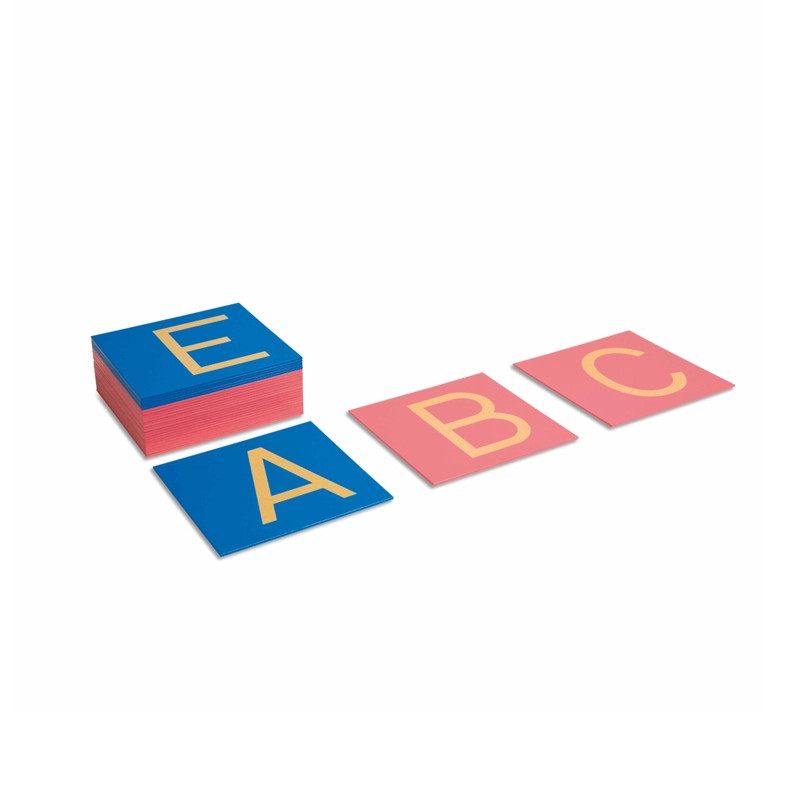
Sandpaper Capitals

Circles, Squares & Triangles
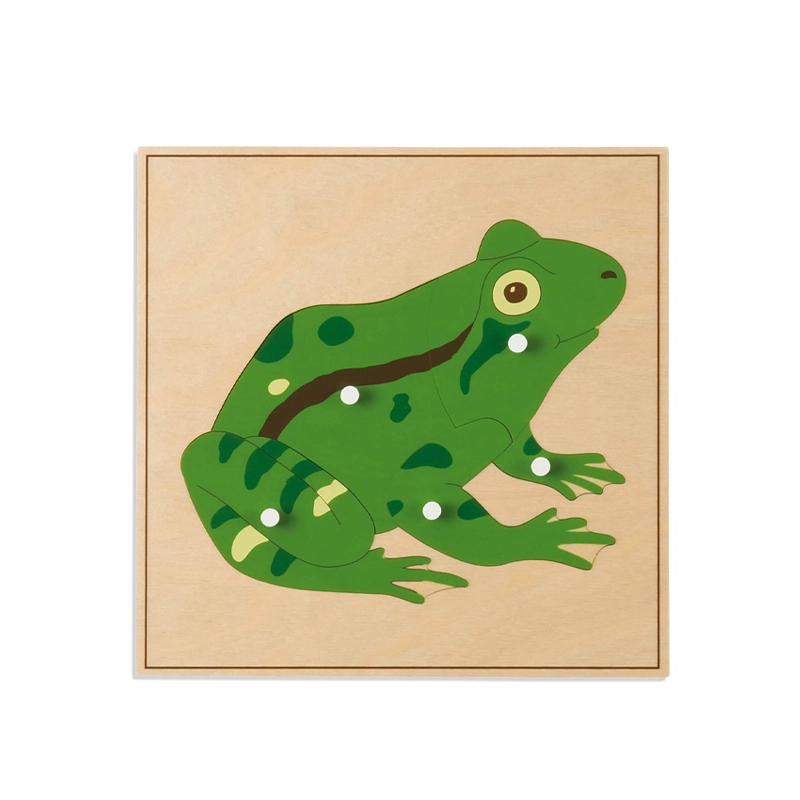
Animal Puzzle

Flag Stand

Number Rods

Individual Beads

Trinomial Cube
Categories of Montessori Materials
Montessori materials are categorized into distinct groups, each fostering specific areas of development.
Practical Life Materials
These are the most common type, featuring stationary sides and a classic design. They typically come in various finishes to match nursery themes.
Sensorial Materials
These materials, designed to refine the senses, include tools like the Pink Tower. Sensory materials help children understand concepts like size, shape, and color by engaging sight, touch, and sound.
Language Materials
Language materials, such as Movable Alphabets and Sandpaper Letters, focus on phonetics and early literacy. These tools introduce reading and writing in an intuitive and tactile way.
Mathematical Materials
Mathematical materials make abstract concepts tangible. For example, the Golden Beads system teaches addition, subtraction, and multiplication through hands-on exploration.
Biological Materials
These tools, from nature trays to life-cycle models, cultivate an understanding of living organisms and the natural world. They spark curiosity and a deeper appreciation for science.
Geographical Materials
Maps, globes, and cultural puzzles introduce children to diverse landscapes and cultures. They encourage global awareness and critical thinking.
Infants & Toddlers
For children, materials like texture boards and sound shakers are more straightforward and focus on sensory stimulation. Support motor skills and cognitive development.
How to Choose Montessori Materials
Choosing the right Montessori materials requires careful consideration of several factors:
- Age Appropriateness: Ensure materials match your child’s developmental stage.
- Quality Matters: Opt for authentic materials from durable, natural materials like wood.
- Focus on Interests: Observe your child’s natural curiosities and select tools that cater to them.
- Learning Goals: Identify whether the materials support literacy, numeracy, or practical skills.
- Open-Ended Play: Select tools that encourage creativity and exploration rather than rigid instruction.
Montessori Materials by Age Group
Montessori materials are tailored to specific developmental stages, ensuring children are challenged without being overwhelmed.

Infants and Toddlers (0–3 Years)
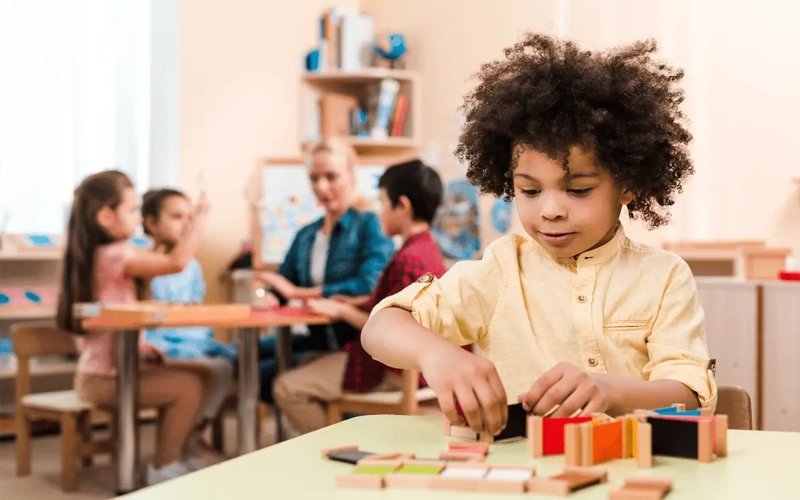
Preschoolers (3–6 Years)

Elementary Children (6–12 Years)
How Do Montessori Materials Work?
Montessori materials are more than teaching tools—they are a bridge to independent learning.
-
Hands-On Learning Children engage directly with materials, turning abstract ideas into concrete understanding. For example, stacking blocks demonstrates the concept of balance and proportion.
-
Error Control Many materials include built-in error control, allowing children to self-correct mistakes. This feature encourages problem-solving and resilience.
-
Process Sequence Activities are designed to follow logical sequences, helping children understand order and progression. Sorting objects by size or color lays the groundwork for math and logic skills.
-
Fine Motor Skills Using materials like threading beads or transferring objects with tongs refines motor skills and improves hand-eye coordination.
-
Master One Skill at a Time Montessori tools focus on isolating specific skills, ensuring children master one concept before moving on to the next.
-
Automatic Teaching These materials often “teach themselves,” guiding children to learn independently with minimal adult intervention.
Reggio Emilia Toys
Reggio Emilia toys are open-ended, natural, and versatile play materials designed to stimulate a child's curiosity and encourage exploration. Unlike traditional toys with predefined purposes, these toys allow children to invent their play scenarios, making them powerful tools for fostering creativity.
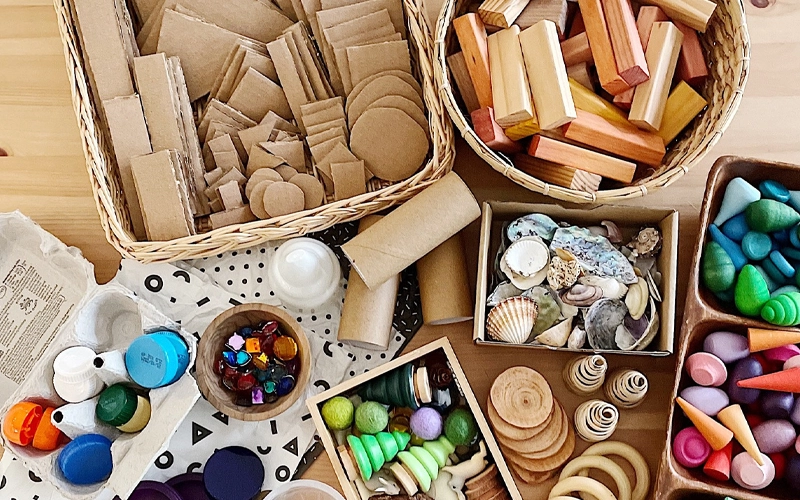
Reggio Emilia Toys for Creative and Inquiry-Based Learning
Our collection of Reggio Emilia Toys includes open-ended play materials, natural wooden blocks, sensory exploration sets, light tables, and creative art tools. Designed to support the Reggio Emilia approach, these toys inspire curiosity, encourage self-expression, and promote collaborative learning, all crafted to align with Reggio Emilia’s educational philosophy.

Wood Craft Kits

Mandala Toys Kit

Sensory Bin Tools

Natural Wooden Block Set
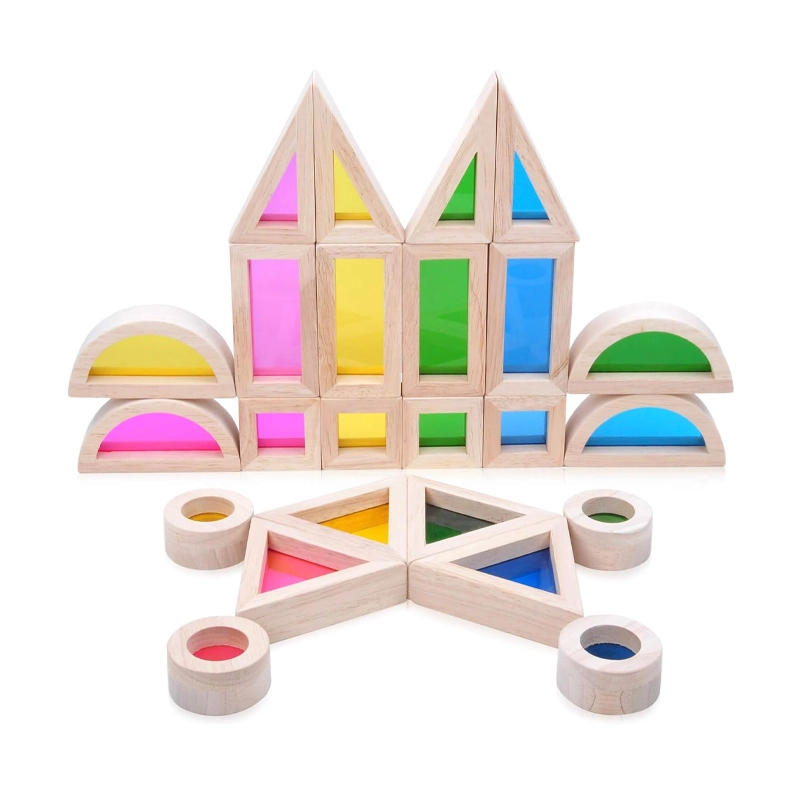
Building Blocks Set

Rainbow Gem Cubes Blocks

Sorting Stacking Balancing Stone

Multicultural Dolls for Kids
Key Features of Reggio Emilia Toys
Reggio Emilia toys stand out from conventional toys due to their unique characteristics. Here are the key features that define them:
Open-Ended Design
Reggio toys do not have a predefined purpose or set of instructions. A child might use a set of wooden blocks to build a tower, a bridge, or even imagine them as vehicles. The possibilities are endless.
Natural Materials
Most Reggio toys are made from natural materials like wood, bamboo, metal, and fabric. These materials provide a sensory-rich experience for children, fostering a deeper connection to the environment.
Minimalistic Aesthetic
Reggio Emilia toys often have a simple, uncluttered design. This encourages children to focus on the functionality and creative potential of the toy, rather than being distracted by bright colors or flashing lights.
Sustainability
Eco-friendliness is a core principle of Reggio toys. By using natural and recyclable materials, these toys teach children the importance of caring for the planet.
Top Examples of Reggio Emilia Toys

Wooden Blocks
A staple in any Reggio Emilia-inspired playroom, wooden blocks are incredibly versatile. Children can build towers, create bridges, or even craft imaginary worlds.

Loose Parts
Loose parts like pebbles, shells, or corks offer infinite possibilities for creativity. These can be arranged, sorted, or combined into unique structures.
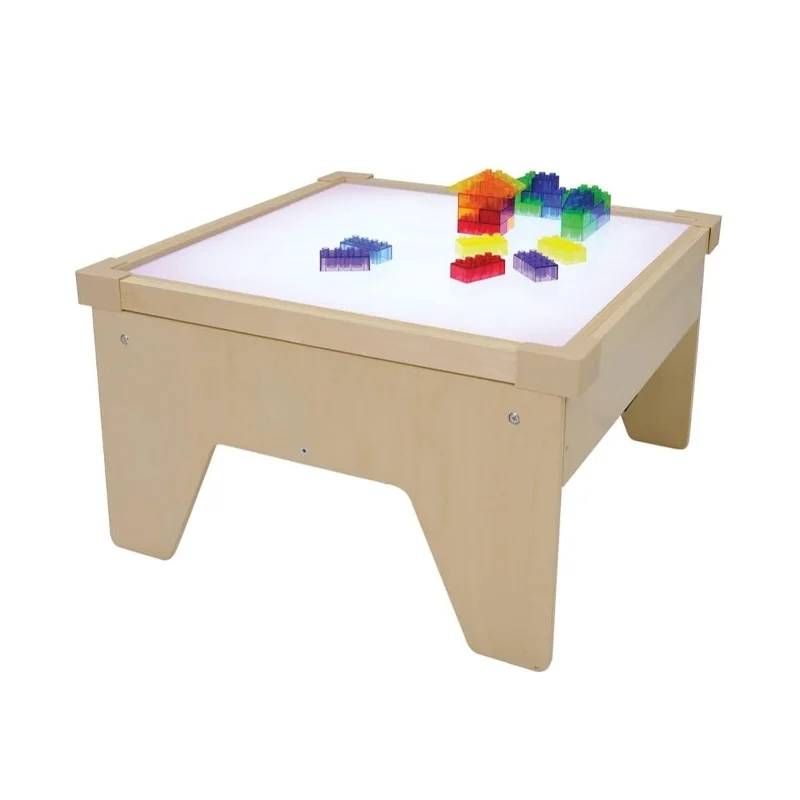
Light Tables
A light table enhances sensory exploration. Pair it with translucent shapes or natural objects for dynamic play experiences.

Mirrors
High-quality crayons, watercolors, and clay allow children to express themselves artistically while refining motor skills.

Art Supplies
Eco-friendliness is a core principle of Reggio toys. By using natural and recyclable materials, these toys teach children the importance of caring for the planet.

Art Supplies
Eco-friendliness is a core principle of Reggio toys. By using natural and recyclable materials, these toys teach children the importance of caring for the planet.
The Educational Benefits of Reggio Emilia Toys
Reggio Emilia toys are more than playthings—they are educational tools that support key developmental milestones.
Encourage Problem-Solving Skills
Children experiment with different ways to use the toys, which builds critical thinking.
Promote Social Skills
These toys often invite collaborative play, teaching kids how to share and work together.
Support Language Development
Role-playing and storytelling help enhance vocabulary and communication.
Nurture Emotional Intelligence
By exploring scenarios and expressing feelings, children develop emotional awareness.
Waldorf Toys
The educational philosophy of Rudolf Steiner, the founder of Waldorf education, inspires Waldorf toys. These toys support holistic child development by encouraging open-ended play, imagination, and sensory exploration. They are made from natural wood, wool, and cotton and often feature simple, handcrafted designs.

Waldorf Toys for Imaginative and Natural Play
Our range of Waldorf Toys features handcrafted wooden toys, natural fiber dolls, stacking sets, and open-ended play materials. Rooted in the Waldorf philosophy, these toys emphasize simplicity, creativity, and connection to nature. Designed to nurture imagination and holistic development, they are ideal for early childhood and Waldorf-inspired learning environments.

Silks Rainbow Streamer

Rainbow Fairy Wings
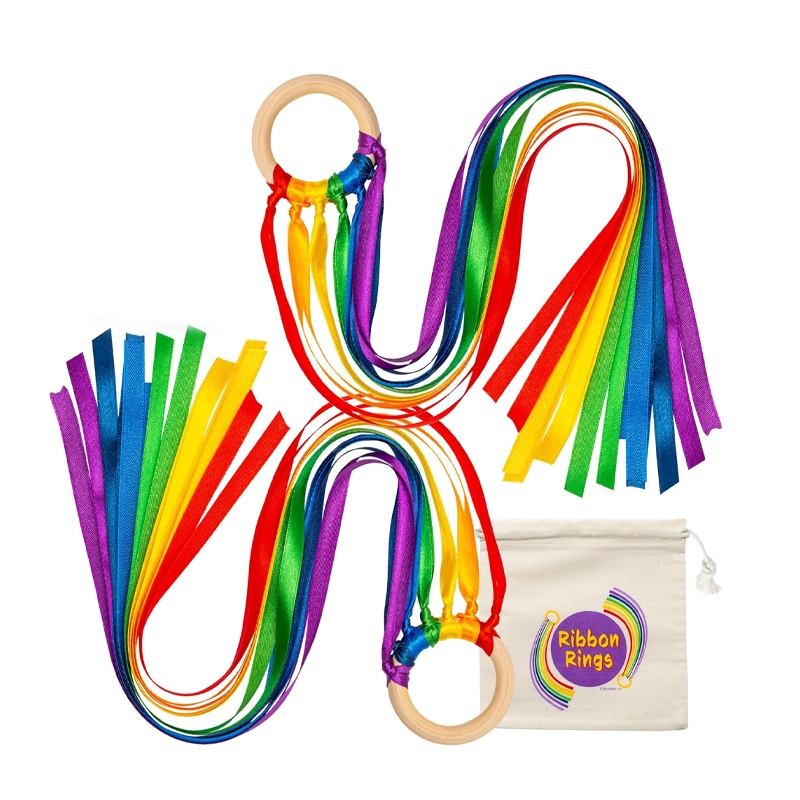
Hand Kite Ribbon Toy

Play Scarves Set

Balls in Cups

Rainbow Wooden Peg Dolls
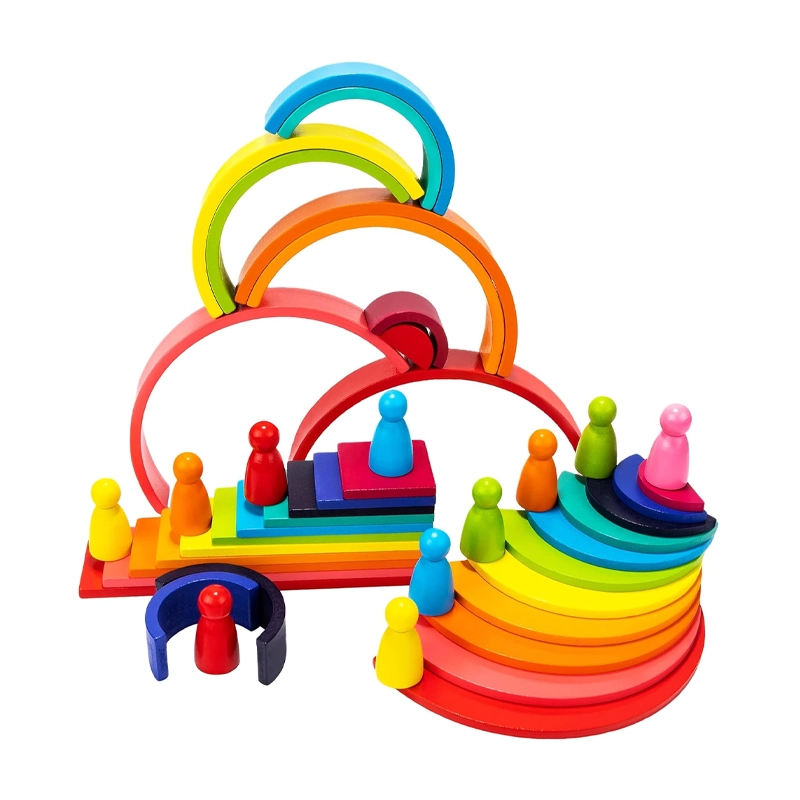
Rainbow Stacking Toys

Open Ended Busy Board
Types of Waldorf Toys

Wooden Blocks
Timeless and versatile, wooden blocks support spatial awareness, coordination, and creativity.

Silk Scarves
These colorful and soft scarves can become costumes, landscapes, or even dance props in a child’s imaginative world.

Felted Figures and Animals
Handcrafted felted toys provide texture-rich play opportunities while representing natural elements.

Dolls and Puppets
Waldorf dolls, often made from wool and cotton, are intentionally simple, enabling children to project their emotions onto them.

Nature-Inspired Playsets
Playsets featuring forests, animals, or weather elements encourage a connection to nature.
Key Features of Waldorf Toys
Sustainability and Eco-Friendliness
Waldorf Toys are made with non-toxic, sustainable materials. From the dyes used to the packaging, everything reflects an eco-conscious approach.
Durability
These toys are built to last. Unlike plastic toys that may break or wear out, wooden Waldorf Toys can withstand years of play, making them an investment that grows with the child.
Neutral Color Palette
Pastel tones and earthy colors dominate Waldorf Toys. These hues are soothing and help children focus on play rather than being overstimulated.
Handcrafted Quality
Many Waldorf Toys are handmade, ensuring that each piece is unique and carries a sense of warmth and care.
How Waldorf Toys Support Development
Waldorf toys align with key stages of child development, providing age-appropriate challenges and stimulation.
For Infants and Toddlers
Soft toys, teething rings, and simple rattles made from natural materials are ideal. These toys help develop sensory awareness and fine motor skills.
For Preschoolers
Blocks, puzzles, and play silks encourage creativity, hand-eye coordination, and problem-solving skills.
For School-Age Children
Older children benefit from toys that support role-play, storytelling, and advanced construction, such as dollhouses or elaborate building sets.
STEM Toys
STEM toys represent learning tools aligned with the educational focus on science, technology, engineering, and mathematics. These toys encourage active participation, hands-on experimentation, and creative problem-solving. From coding robots to chemistry kits, STEM toys transform complex concepts into engaging activities that captivate children’s minds.

STEM Toys for Hands-On Learning and Innovation
Discover an extensive collection of STEM toys, including robotics kits, building blocks, coding games, and science experiment sets. Designed to foster critical thinking, problem-solving, and creativity, our toys support hands-on learning and align with STEM education principles for children of all ages.

Educational Learning Toys
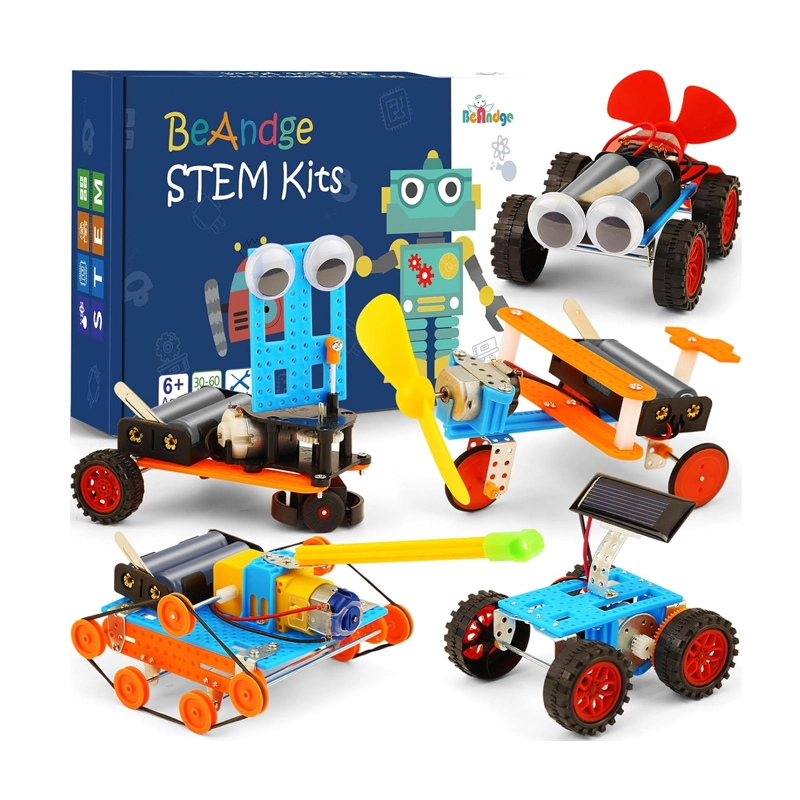
Robot Building Kit

Logic Road Builder

Dinosaur Toy

Engineering Projects STEAM

Construction Building Blocks

Building Crafts Kits

Microscope for Kids
STEM Toys by Grade
STEM toys are tailored to match the developmental needs of children at different educational levels. Here's a closer look:
Kindergarten
At this stage, children thrive on sensory exploration and basic problem-solving. STEM toys for kindergartners focus on simple concepts presented through tactile and colorful designs.
- Recommended Toys: Building blocks, counting sets, magnetic tiles, and beginner coding kits like Bee-Bots.
- Learning Objectives: Develop fine motor skills, shape recognition, and early logic skills.
First Grade
First graders enjoy slightly more complex challenges that involve fundamental physics, patterns, and storytelling.
- Recommended Toys: Marble runs, beginner robotics kits, and puzzles.
- Learning Objectives: Foster hand-eye coordination, spatial reasoning, and early engineering principles.
Second Grade
By second grade, children are ready for more structured play that involves critical thinking and problem-solving.
- Recommended Toys: Snap Circuits, introductory science kits, and simple coding robots.
- Learning Objectives: Enhance understanding of cause and effect, basic programming, and creative thinking.
Third Grade
Third-grade children begin to grasp more advanced STEM concepts, such as mechanical systems and coding logic.
- Recommended Toys: LEGO Technic sets, coding platforms like Scratch, and mini-lab kits for experiments.
- Learning Objectives: Develop engineering skills, coding proficiency, and curiosity about scientific phenomena.
Fourth Grade
Fourth graders are ready to take on challenging STEM projects, combining creativity and analytical thinking.
- Recommended Toys: 3D printing pens, advanced robotics kits, and environmental science kits.
- Learning Objectives: Build resilience, refine problem-solving skills, and explore interdisciplinary connections.
Fifth Grade
Fifth graders can handle complex projects and begin applying STEM principles to real-world problems.
- Recommended Toys: Arduino starter kits, astronomy sets, and mechanical model kits.
- Learning Objectives: Enhance computational thinking, design skills, and teamwork.
Benefits of STEM Toys
Encourage Problem-Solving
STEM toys challenge children to think critically and find solutions, fostering their ability to analyze and overcome obstacles.
Builds a Growth Mindset
By allowing room for trial and error, STEM toys teach kids that failure is a stepping stone to success, cultivating resilience.
Sparks Creativity
Open-ended toys like building blocks or coding platforms empower children to explore their imagination and create without limits.
Prepares for Future Careers
Exposure to STEM concepts at an early age gives kids a head start in fields that are increasingly in demand, such as engineering, computer science, and healthcare.
Fosters Collaboration
Many STEM toys encourage teamwork, teaching kids how to communicate effectively and work together to achieve goals.
Puzzle Toys
Puzzle toys are a broad category of interactive tools that encourage players to use critical thinking, logical reasoning, and spatial awareness to achieve specific objectives. They range from traditional jigsaw puzzles to modern brain teasers and digital puzzle apps. Puzzle toys stimulate the mind, improve problem-solving skills, and provide a sense of accomplishment.
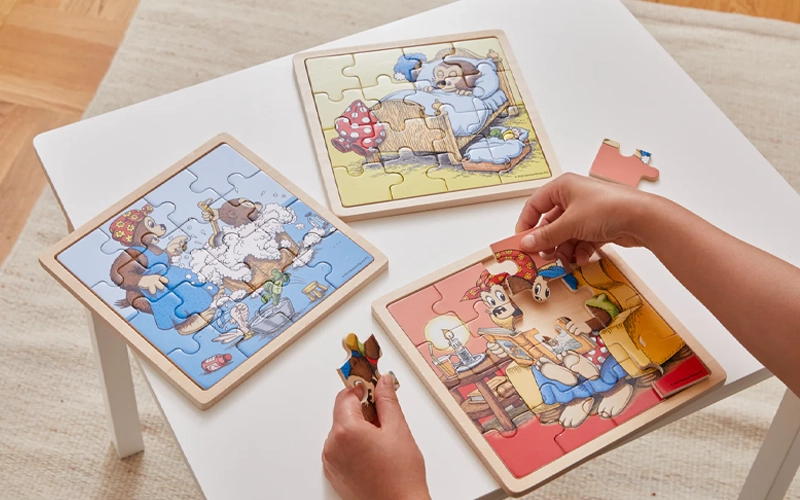
Puzzle Toys for Cognitive Development and Fun Challenges
Our range of Puzzle Toys includes jigsaw puzzles, 3D puzzles, wooden puzzles, and brain teasers. These thoughtfully designed toys help develop problem-solving abilities, spatial reasoning, and fine motor skills. Suitable for children of various ages, they offer a balanced mix of challenge and enjoyment, making them ideal for educational and recreational settings.

Correcting Alphabet Wooden Puzzles

Shape Sorting Puzzle

ABC Puzzle Shape

Construction Vehicle Jigsaw Puzzles

Sea Animal Puzzle

Solar System Puzzle
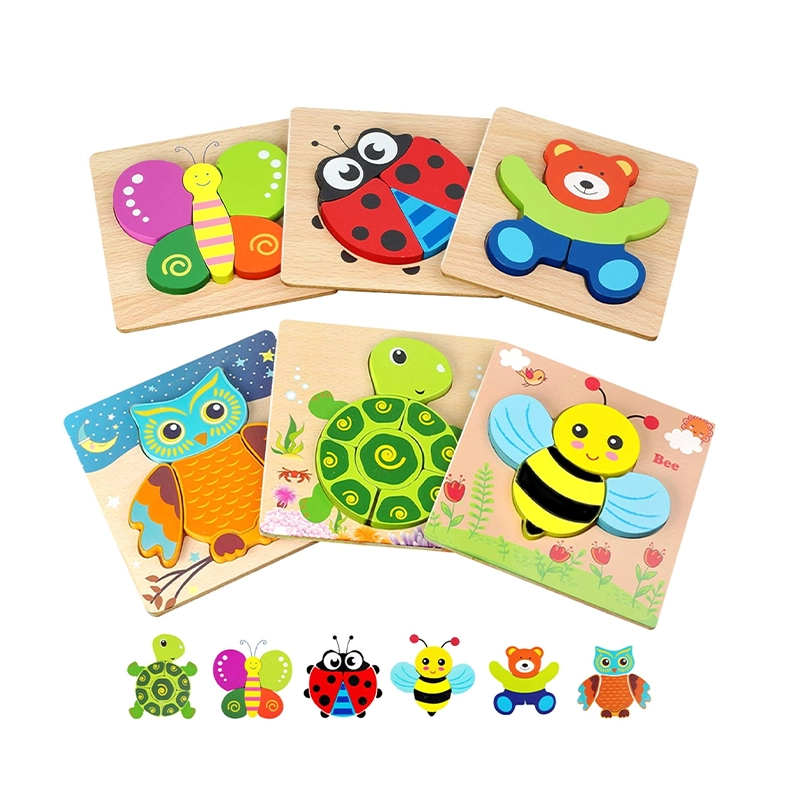
Animals Puzzles
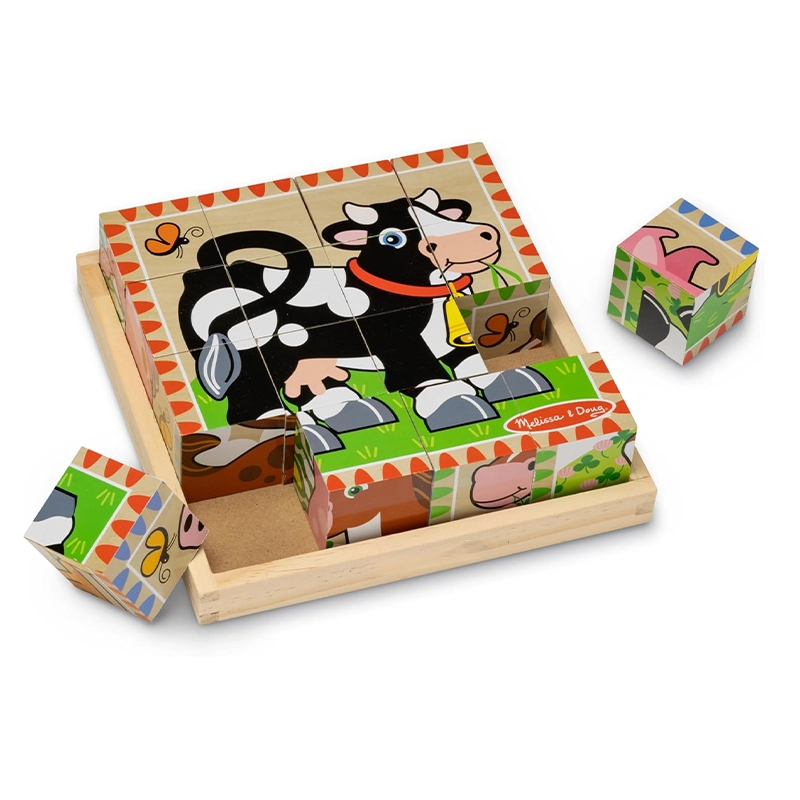
Cube Puzzle
Puzzle Toys by Age Group
Puzzle toys are educational playthings that challenge the mind through activities requiring problem-solving, spatial reasoning, and critical thinking. These toys can be as simple as matching games for toddlers or as complex as interlocking 3D puzzles for adults. They offer a playful and engaging way to develop logical reasoning, concentration, and patience skills.
Toddlers (1-3 Years)
For toddlers, puzzles should focus on large, easy-to-handle pieces and simple objectives. Examples include shape sorters, stacking puzzles, and knob puzzles. These toys introduce concepts like colors, shapes, and matching while improving fine motor skills.
School-Aged Children (6-12 Years)
Children can handle more intricate puzzles like 3D models, geography, and strategy-based games at this stage. These toys foster critical thinking, patience, and a sense of accomplishment upon completion.
Teenagers and Adults (13+ Years)
Teenagers and adults often enjoy advanced puzzle toys, including brainteasers, Rubik’s Cubes, and intricate wooden or metal puzzles. These games provide mental stimulation, reduce stress, and improve focus.
Types of Puzzle Toys

Jigsaw Puzzles
Classic jigsaw puzzles range from simple 10-piece sets for toddlers to intricate 1,000-piece designs for adults. These puzzles improve spatial reasoning and attention to detail.

3D Puzzles
3D puzzles add a new dimension to traditional puzzles. They are excellent for improving hand-eye coordination and understanding spatial relationships.

Logic Games
Logic Games like Sudoku, crossword puzzles, and riddles sharpen logical thinking and keep the mind agile.

Shape-Sorting Puzzles
Popular with toddlers, these puzzles involve matching shapes to corresponding slots, enhancing color and shape recognition.

Rubik’s Cube and Similar Toys
The Rubik’s Cube and similar logic-based toys promote problem-solving and algorithmic thinking, offering endless combinations to explore.

Mechanical Puzzles
Wooden or metal mechanical puzzles challenge players to disassemble and reassemble intricate structures, testing patience and precision.
Benefits of Puzzle Toys
Cognitive Development
Puzzle toys enhance brain functions such as memory, reasoning, and spatial awareness. Solving puzzles requires attention to detail and logical sequencing, promoting overall mental acuity.
Improved Problem-Solving Skills
These toys challenge players to analyze situations, develop strategies, and find solutions. The process fosters critical thinking and adaptability.
Boosts Patience and Focus
Completing puzzles teaches persistence and the value of working methodically. It’s a rewarding experience that builds focus and determination.
Encourages Teamwork
Many puzzle toys, such as escape room kits or collaborative board games, encourage group participation, improving communication and teamwork skills.
Stress Relief for All Ages
Engaging with puzzles can provide a therapeutic escape, reducing stress and promoting relaxation through focused activity.
Music Toys
Music toys are playful tools designed to introduce individuals—especially children—to the essential elements of music, including rhythm, melody, and harmony. These toys vary in complexity, from simple handheld instruments to sophisticated electronic devices. Music toys entertain and serve as a foundation for developing creativity, motor skills, and auditory awareness.

Music Toys for Skill-Building and Fun Play
A curated selection of Music Toys, including percussion instruments, xylophones, mini keyboards, and rhythm sets. Designed to inspire auditory development, coordination, and creativity, our durable and safe musical tools cater to children of all ages, supporting early learning through play.

Fun Musical Instruments

Percussion Instruments Set

Wooden Music Set

Baby Drum Set

Magic Touch Piano

Musical Pounding Toy

All-in-one Musical Set

Sensory Educational Toys
Music Toys by Age Group
Infants (0-12 Months)
For infants, Music Toys focus on sensory exploration and simple interaction.
Recommended Toys:
- Rattles: Help babies discover sound and rhythm.
- Crib Mobiles with Music: Soothing melodies aid sleep and relaxation.
- Soft Plush Toys with Sounds: Encourage tactile and auditory exploration.
Toddlers (1-3 Years)
Toddlers benefit from hands-on toys that allow them to explore rhythm and sound independently.
Recommended Toys:
- Xylophones: Introduce basic melodies and colors.
- Drum Sets: Encourage rhythmic exploration.
- Interactive Sound Books: Teach simple songs and sound effects.
Preschoolers (3-5 Years)
Preschoolers can begin learning simple songs and experimenting with different types of instruments.
Recommended Toys:
- Toy Keyboards: Encourage melody creation.
- Tambourines and Maracas: Help develop rhythm and motor skills.
- Mini Guitars: Introduce basic strumming and chords.
Older Kids (6+ Years)
Older kids are ready for more complex music toys that teach advanced skills and concepts.
Recommended Toys:
- Karaoke Machines: Build confidence and encourage vocal practice.
- Electronic Music Kits: Introduce sound engineering and composition.
- Beginner Instruments: Like ukuleles or full-sized keyboards.
Benefits of Music Toys
- Cognitive Development
Music toys stimulate brain development by improving memory, attention span, and pattern recognition. They also help build early math and language skills through rhythm and melody. - Motor Skill Improvement
Playing music toys enhances fine and gross motor skills. Actions like pressing keys or striking drums develop coordination and muscle strength. - Emotional Expression
Music toys provide a safe outlet for expressing emotions, promoting emotional intelligence and stress relief in children. - Social Interaction
Group play with music toys teaches teamwork, turn-taking, and communication. It’s a great way to bond with friends and family while exploring music. - Creativity and Imagination
Music toys inspire children to create their own tunes, encouraging improvisation and artistic expression.
Types of Music Toys
- Percussion Instruments
Drums, tambourines, and maracas are perfect for introducing rhythm and coordination. Percussion instruments are often a child’s first step into music. - String Instruments
Mini guitars, ukuleles, and harps let children explore melody and harmony. These instruments are great for older kids interested in music composition. - Keyboards and Pianos
Electronic keyboards and toy pianos offer an accessible way to learn melody, rhythm, and basic music theory. Many include pre-recorded songs to help children play along. - Wind Instruments
Recorders, harmonicas, and whistles help kids develop breath control while introducing them to melody and pitch. - Electronic Music Toys
Electronic music-making devices like synthesizers and soundboards allow children to experiment with modern sounds and create unique compositions. - Musical Plush Toys
Musical plush toys with lights and sounds provide sensory stimulation while comforting infants.







FAQs
Montessori materials are designed to promote hands-on learning and independence. They encourage children to explore and learn at their own pace, helping develop fine motor skills, sensory perception, and cognitive abilities through practical activities.
Reggio Emilia toys focus on open-ended play, stimulating creativity and critical thinking. They often use natural materials, allowing children to direct their learning experiences and fostering exploration and expression.
Waldorf toys are crafted to nurture a child's imagination and sensory development. They are typically made from natural materials and are minimally designed to encourage imaginative play and sensory exploration
STEM toys help develop various skills, including problem-solving, scientific reasoning, and technology proficiency. They are designed to introduce and engage children in science, technology, engineering, and mathematics through interactive and fun activities.
Puzzle toys enhance cognitive skills such as spatial awareness, memory, and problem-solving. They challenge the mind and can help improve hand-eye coordination and fine motor skills.
Toys stimulate brain areas involved in music, speech, and emotional development. They can enhance auditory skills, improve memory, and foster creativity through rhythms and melodies.
Educational toys can seamlessly integrate into daily learning activities to enhance academic outcomes. They provide practical applications of theoretical concepts and can be used to reinforce lessons in engaging, interactive ways.
Educational toys come in various forms that cater to different age groups, each designed to support appropriate developmental milestones. From simple sensory toys for toddlers to complex construction sets for older children, toys can be tailored to specific age-related needs.
When selecting toys, ensure they meet safety standards, such as non-toxic materials and appropriate age markings. Also, consider the child's interests and developmental stage when choosing safe and engaging toys.
- Educational Toys: These toys are designed with specific learning goals, such as promoting cognitive development, fine motor skills, or problem-solving. They often use open-ended play to encourage creativity and self-direction.
- Traditional Toys: Typically, these toys do not have a specific educational goal but are still valuable for social and emotional development. They focus on imaginative play and often help children learn social skills through role-play and interaction.

